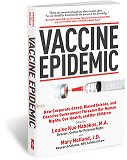Research: From the Superb to the Questionable
by F Edward Yazbak MD
vaccinationnews.com
Excerpts:
It is safe to say that in the last few years, researchers who dared question a vaccination policy or only mention vaccination and autism in the same sentence were certain to get a public and unrelenting flagellation.
I was therefore overjoyed when the accomplishment of a distinguished researcher in that venue was recognized. It was certainly wonderful to hear that the Briloff Committee at Baruch College very recently awarded The Briloff Prize for 2012 to Dr. Gayle DeLong for her magnificent exposé titled “Conflicts of Interest in Vaccine Safety Research”. In the citation, the Committee described Dr. DeLong’s publication as “an excellent exposition of ethical issues and biases in the examination of conflicts of interests related to vaccine safety research. The main thrust of this paper is the questioning of the ethics of industry sponsorship of vaccine use”
The abstract of Dr. DeLong’s article on PubMed summarizes the extensive document quite clearly:
Conflicts of interest (COIs) cloud vaccine safety research. Sponsors of research have competing interests that may impede the objective study of vaccine side effects. Vaccine manufacturers, health officials, and medical journals may have financial and bureaucratic reasons for not wanting to acknowledge the risks of vaccines. Conversely, some advocacy groups may have legislative and financial reasons to sponsor research that finds risks in vaccines. Using the vaccine-autism debate as an illustration, this article details the conflicts of interest each of these groups faces, outlines the current state of vaccine safety research, and suggests remedies to address COIs. Minimizing COIs in vaccine safety research could reduce research bias and restore greater trust in the vaccine program.
Dr. Delong’s previous publication (2011) titled “A positive association found between autism prevalence and childhood vaccination uptake across the U.S. population was, I thought, just as remarkable. Its PubMed abstract was also an informative and clear summary of the author’s extensive research:
The reason for the rapid rise of autism in the United States that began in the 1990s is a mystery. Although individuals probably have a genetic predisposition to develop autism, researchers suspect that one or more environmental triggers are also needed. One of those triggers might be the battery of vaccinations that young children receive. Using regression analysis and controlling for family income and ethnicity, the relationship between the proportion of children who received the recommended vaccines by age 2 years and the prevalence of autism (AUT) or speech or language impairment (SLI) in each U.S. state from 2001 and 2007 was determined. A positive and statistically significant relationship was found: The higher the proportion of children receiving recommended vaccinations, the higher was the prevalence of AUT or SLI. A 1% increase in vaccination was associated with an additional 680 children having AUT or SLI. Neither parental behavior nor access to care affected the results, since vaccination proportions were not significantly related (statistically) to any other disability or to the number of pediatricians in a U.S. state. The results suggest that although mercury has been removed from many vaccines, other culprits may link vaccines to autism. Further study into the relationship between vaccines and autism is warranted.
Read the Full Article Here: http://www.vaccinationnews.com/research-superb-questionableYazbakFE
Vaccine Epidemic
by Louise Kuo Habakus and Mary Holland J.D.
FREE Shipping Available!






